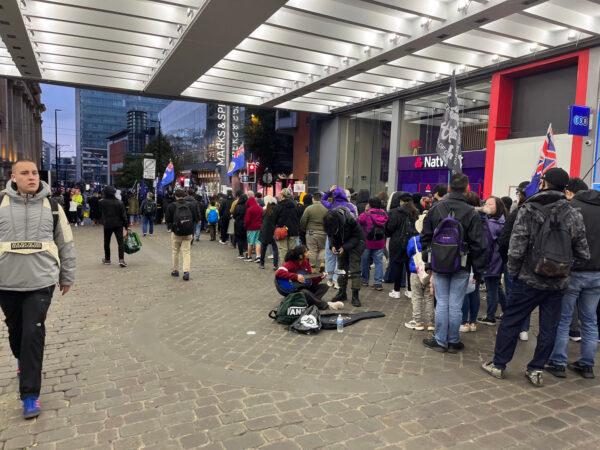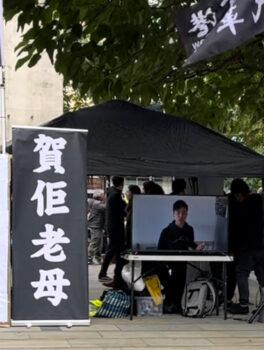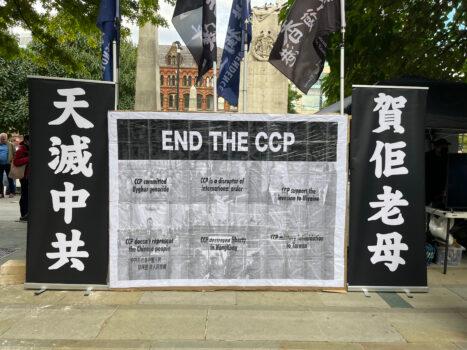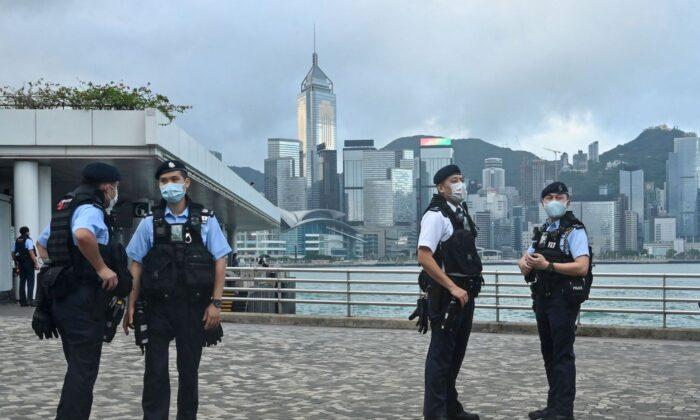There was a strong police presence on Hong Kong streets on Oct. 1, the 73rd anniversary of the fall of China to the Chinese Communist Party (CCP). Termed as the National Day of the People’s Republic of China by the CCP, communist flags flew all over subdued Hong Kong while across the world in Manchester, U.K., a large crowd of Hongkongers in exile gathered to protest the loss of freedom in the city of their birth.
U.K.-based HK Indigenous Defence Force and Manchester Hongkonger Association joined forces at the rally held at St. Peter’s Square to call for global resistance against the CCP and its authoritarianism.
Several renowned Hongkongers in exile were invited to speak, among them former Yuen Long District Councilor To-Ka Lun, political activist Finn Lau, veteran commentator Ching Cheong, and the convenor of Hong Kong Independent Alliance Wayne Chan.
The rally started with speeches from the guests, followed by a march that included many young people and families from Hong Kong, chanting slogans such as, “Say no to China,” “Hong Kong is not China,” “Free Hong Kong,” “Fight for freedom, stand with Hong Kong.”

A spokesperson for the HK Indigenous Defence Force said that according to local police, the number of rally attendees reached 1,200.
‘End Sister Cities’
Hong Kong activist Finn addressed the rally via video and called for an end to the sister cities program with China in order to resist the CCP’s influence.Law encouraged overseas Hongkongers to learn from the lessons of the 2019 protest, preserve Hong Kong’s history and language, and maintain the cultural identity of the Hong Kong people.
He further advocated for Hongkongers to remind Western countries that the CCP can never be trusted, and dismantling the Party’s economic resources and legitimacy internationally is the only way to defend freedom.

Dr. Lit, a traditional Chinese medicine doctor from Hong Kong, had a Ukrainian flag on his shoulders.
He said that on the CCP’s “National Day” on Oct. 1, he can only remember the martyrdom of the protester Marco Leung and the incident where the Hong Kong police opened fire on a protester.
Other rally attendees chanted the call for an end to the CCP. Dr. Lit encouraged the audience to never give up and to have faith and fight on.
Political commentator Ching Cheong spoke at the rally and said that the CCP historically has relied on three pillars to seize power: violence, deceit, and collusion with foreign powers.
Cheong spoke about the violence of the 1950s and 1960s when the CCP incited followers to riot and seize private land without any compensation and to kill all so-called “counter-revolutionaries” such as “landlords and capitalists.”
One example he gave of the CCP’s early use of violence to seize power was the CCP’s Hunan Provincial Committee which issued orders to kill anyone deemed as “counter-revolutionaries.”
Cheong said that deceit was the second tool used by the CCP and gave an example of how Mao Zedong told a Reuters reporter in 1945 that he wanted to build a new free, and democratic China.
Mao told the reporter, “A free and democratic China would be a country where all levels of government, up to the central government, would be elected by universal suffrage and would be accountable to the people who elected them. It would reflect Dr. Sun Yat-sen’s three principles of democracy, President Lincoln’s ideals of the government of the people, by the people, and for the people, and President Roosevelt’s four freedoms: freedom of speech, freedom of worship, freedom from want, and freedom from fear.”
Cheong said such a beautiful lie deceived a generation of Chinese people as well as the United States and other Western nations.
He then spoke about the CCP’s collusion with foreign powers, with the Soviet Union, in particular, helping the CCP grow stronger in the 20th century. In order to gain the backing of the Soviet Union, the CCP was willing to give up 150 million hectares of land that Soviet leader Vladimir Lenin had earlier declared three times that he would return to China.
Even during World War II, the CCP cooperated with Japan to sabotage the Republic of China at a time when the communists were supposedly fighting the Japanese invasion with the Nationalist Chinese government. The CCP would cooperate with the Japanese military in exchange for their forces not invading CCP-held territories.
The CCP has relied on these three pillars to seize and consolidate power, and gradually these characteristics have become intertwined in the Party’s DNA, he said.
‘Transformed Into an Unfree Society’
Cheong further called on Hongkongers in exile to use their own experiences as examples to show the world the true nature of the CCP.“Since the handover to China, Hong Kong has shown the world a textbook case of how a once free metropolis has been transformed into an unfree society in a short span of 25 years,” Cheong said.
“Once a haven for mainland Chinese seeking freedom, it now produces its own political refugees who are scattered all over the world. If the world continues to appease the CCP, the free world will be walking into a crisis.”

A Bloody Record
During its early history, the CCP took advantage of people’s dissatisfaction with society, using it to defeat their opponents while becoming the voice of China. After the CCP took over China in 1949, its only expertise seemed to be in killing the Chinese people indiscriminately.In the course of the Land Reform Movement, the Korean War, the Great Leap Forward, and the Cultural Revolution, the CCP’s reign of terror resulted in nothing but massacres and extreme poverty.
At one time, the CCP said that population growth was good and encouraged childbirth; later, it switched to suppressing population growth and introduced the one-child policy, which led to forced abortions en masse.
Following the 1989 Tiananmen Square Massacre, the CCP took advantage of China’s cheap labor to coax the Western countries into fully opening up their markets while it succeeded in joining the World Trade Organization (WTO).
However, the Chinese regime secretly worked to commit intellectual property theft worldwide. Using the lies of “one country, two systems” to deceive Hong Kong, the CCP signed the Sino-British Joint Declaration which resulted in the U.K. ceding Hong Kong to China in 1997.
Convenor of Hong Kong Independent Alliance Wayne Chan told rally attendees at the end, “It is hard to imagine what will happen next month or next year. What we can do is to live without regrets and with dignity, and hope that we will not forget our love for Hong Kong and for our people.”
